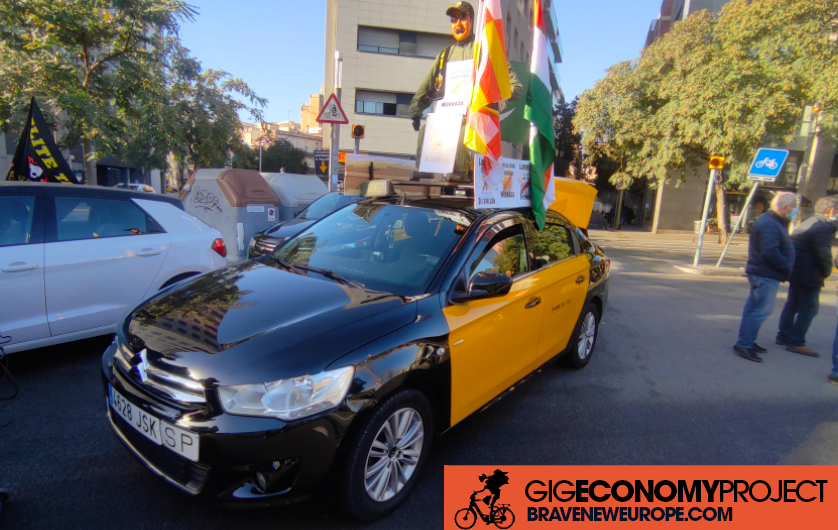Elité Taxi faces the potential of a crippling fine from the Catalan Competition Authority, after Uber complained of anti-competitive conduct including “acts of boycott, aggressive and denigrating practices”

The Gig Economy Project, led by Ben Wray, was initiated by BRAVE NEW EUROPE enabling us to provide analysis, updates, ideas, and reports from all across Europe on the Gig Economy. If you have information or ideas to share, please contact Ben on GEP@Braveneweurope.com.
This series of articles concerning the Gig Economy in Europe is made possible thanks to the generous support of the Andrew Wainwright Reform Trust.

BARCELONA’S taxi drivers have once again shutdown the city’s arteries in a ‘slow march’ through the Catalan capital in defence of “freedom of expression” and in opposition to what their union, Elité Taxi, describes as an attempt by Uber to “muzzle” them.
Organisers say 2200 ‘taxistas’ were present on the mobilisation, which started in Plaça Espanya and made it’s way through the centre of the city before ending up outside the Catalan Parliament, where speeches were heard and a delegation went inside to meet politicians.
It comes just a few weeks after Elité Taxi and Taxi Project 2.0 – both led by Barcelona taxi leader Alberto ‘Tito’ Álvarez – were informed by the Catalan Competition Authority (ACCO) that a sanctioning file had been opened against them, following a complaint made by Uber.
According to the ACCO, the alleged infringement “could constitute prohibited anti-competitive conduct that would include acts of boycott, aggressive and denigrating practices, encouraging associated taxi drivers and other taxi drivers in the Barcelona Metropolitan Area (AMB) not to join Uber or to unsubscribe from the service”.
Specifically, Elité Taxi and Taxi Project are accused of violating Article 3 of the Spanish Law of Defense of the Competition, relating to “acts of unfair competition that by distorting free competition affect the public interest”, and is effectively a transposition of EU competition laws.
The investigation and resolution of the file must be completed within 18 months. ACCO say the opening of the file “in no case prejudges the final resolution”.
If the ACCO rules that the breach is serious, it can fine Elité Taxi and Taxi Project 5% of their turnover; 10% if it is deemed ‘very serious’. A 10% fine could constitute approximately €1.6 million, according to an Elité Taxi source.
The fine would be paid to the Catalan authorities, not Uber, but it could be the basis for a civil lawsuit by the US ridehail giant to claim damages. Elité Taxi and Taxi Project would have the option to appeal the ACCO’s decision if it goes against them.
Before deciding on the mobilisation, Elité Taxi has undergone a process of consultation with members about the ACCO file, and the association says that “94.95% are in favour of a response on a par with the attacks we are suffering from the multinational”.
Ahead of the demonstration, Elité Taxi issued a statement saying that Uber has “collapsed into complaints” to the ACCO because of its failure to build a presence in the city, that Elité Taxi and Taxi Project “have limited themselves to expressing an opinion shared by many” about Uber.
Elité Taxi added: “Being able to honestly express the danger of Uber penetrating our sector is a mechanism within the freedom of expression that we poor people have to defend ourselves from the power of large corporations like Uber which put so many resources towards censoring our opinions”.
An Elité Taxi source also pointed out that Álvarez has been a critic of ride-hail platforms in general, not solely Uber, with a slow march through Barcelona in September last year against the German company Free Now, a private hire app used by 3000 taxi drivers in Barcelona.
Uber exited the Barcelona market after a decree approved by the Catalan Government in 2019 which would have required Uber’s to be booked one hour before pick-up. The ACCO positioned itself against the decree at the time, saying that it would hinder fair competition and that taxis and ride-hail should be regulated under the same law.
Uber had first appeared in the Catalan capital in 2014 and were met by Elité Taxi mobilisations, which helped convince the Catalan Parliament to introduce a licensing system for private hire cars (VTCs).
In 2021 Uber returned to Barcelona but this time only offering an app service for taxi drivers rather than their own cars, a return which Elité Taxi once again mobilised against, accusing the company of an “illegal” re-entry. The Metropolitan Taxi Institute found that Uber was in breach of regulations because it did not offer a closed price fare. The multi-national is now thought to have a minimal presence in the city.
An investigation of tax fraud against Uber, initiated by Taxi Project, is ongoing with the Spanish tax administration.
Writing on the eve of Thursday’s mobilisation, Taxi Project’s vice-president Carlos Rodríguez described Uber’s approach as “a strategy of fear” to “shut us up, because they know we are disturbing their interests”.
“Uber has not found taxi drivers who want to work with them [in Barcelona],” Rodríguez addd. “And now, as a last resort and desperately, it uses the very public institutions that we all pay for (and to which they do not contribute as Uber has its [European headquarters] outside the Spanish state, more specifically in the Netherlands) to denounce us for warning the society from the dangers of its business model.”
Also ahead of the mobilisation, the Catalan section of Podemos, the junior partner in the Spanish coalition government, tweeted on Wednesday evening: “Today we met in [the Catalan] Parliament with the taxi industry to hear their demands.
“All our support in the fight against the complaints of Uber, an exploitative and precarious platform that wants to monopolise the sector.”
To sign up to the Gig Economy Project’s weekly newsletter, which provides up-to-date analysis and reports on everything that’s happening in the gig economy in Europe, leave your email here.


Be the first to comment